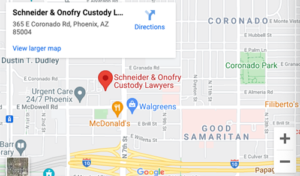Yuma Divorce: Arizona Laws Regarding Refused Visitation and Custody Rights
Once a parenting plan has been finalized by the courts, both parents are expected to follow it. This means that if you are the custodial parent, you will be expected to comply with the visitation schedule, and the non-custodial parent will also be expected to follow this visitation schedule. Of course, plans can change, and a parenting plan should include provisions for how both parents can communicate with one another in the infrequent event that visitation needs to be rescheduled.
today.What You Can Do If Your Child Doesn’t Want to Visit the Non-Custodial Parent?
The reasons why a child might not want to visit with a non-custodial parent can be complex. If your divorce was contentious, if your divorce involved domestic violence, or if family dynamics are fraught, a child might refuse to visit the non-custodial parent. This can be especially an issue with teens or older children, though younger children may also sometimes refuse to visit the non-custodial parent. If your child doesn’t want to visit his or her mom or dad, it is important to understand why this is happening. A child shouldn’t be forced to see a parent if he or she doesn’t want to, but a custodial parent can be held legally accountable if visitation plans aren’t honored. So, what can you do?
First take the time to understand why your child doesn’t want to see his or her parent. Is there an emotional reason? Is he or she afraid or angry at the other parent? Does he or she feel unsafe? The reasons underlying his or her choice may play an important role in the next steps you’ll need to take. For example, if there is anger stemming from divorce, or if your child feels alienated, psychological counseling may be an option. According to the Journal of Clinical Psychology, in the aftermath of highly-conflicted divorce, children may need counseling in order to be reunited with the other parent.
What happens if your child feels unsafe or is being abused? If this is the case, you may need to take the case to court to seek a modification to your parenting plan. A family law firm like Schneider & Onofry, P.C. in Yuma, Arizona may be able to assist you.
If your child is refusing to see his or her parent, and the child is old enough, he or she may have the option or presenting his or her case in family court as well. Sometimes parenting plans are made when a child is young. As a child gets older, he or she may have reasons why he or she may not want to see the other parent. If, after talking to your child, or seeking counseling, your child still doesn’t want to continue with the visitation schedule, you may have the option of seeking a modification in court. With any legal issue, it can be helpful to have a family law firm on your side. Reach out to Schneider & Onofry, P.C., a Yuma, Arizona family law firm to learn more.
What Can I Do If the Other Parent Doesn’t Show Up to Visitations?
It can be devastating for both the parent and the child when the non-custodial parent doesn’t show up to visitations. There may not be much you can do if this happens. You can always talk to the other parent about finding a time that meets his or her schedule, but if you feel that no-shows are causing your child emotional harm, you may want to modify your parenting plan in court. For example, a parenting plan could be modified by including provisions about cancelations or communication. Or a parenting plan could be modified to better meet the other parent’s visitation habits. If you need assistance modifying a parenting plan, consider speaking to the family lawyers at Schneider & Onofry, P.C. in Yuma, Arizona today. Our lawyers may be able to help you.


















